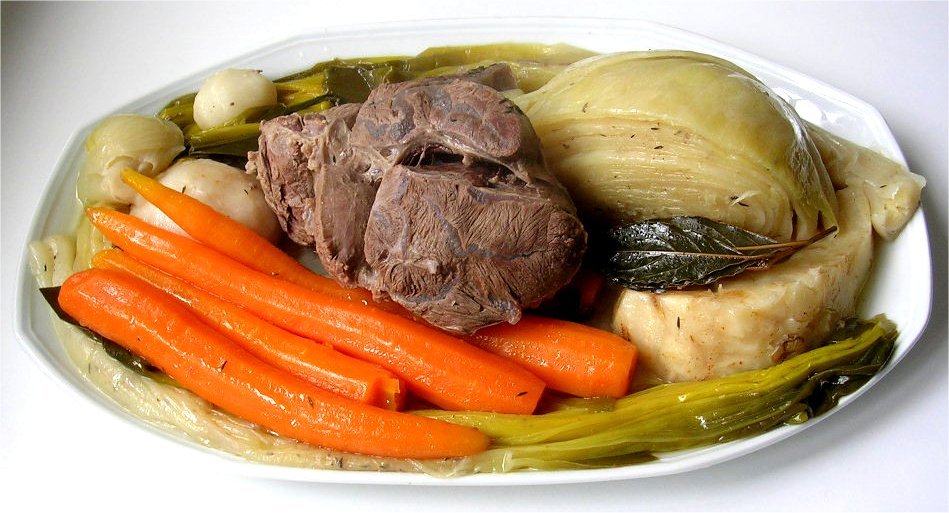
A pot-au-feu (courtesy André, Creative Commons Attribution-Share Alike 3.0 Unported)
One of the feature films shown at the 2023 St. Louis International Film Festival, which has just wrapped, was The Taste of Things. Under its French title, La Passion de Dodin Bouffant, the film won Trần Anh Hùng the Best Director award this year at Cannes and is the French submission for the Academy Awards (not without political controversy, of course).
Taste of Things is a film about the obsessive attention paid by artists to their art. In this case, the medium is food and the artists a gourmand-chef (Benoît Magimel) and his live-in cook and lover (Juliette Binoche), in the French countryside in the 1880s. The film is adapted from a 1924 novel by the Swiss writer Marcel Rouff, who helped invent the French “gastronomic guide.” “Gastronomic Direction” in the film is by Pierre Gagnaire, a multiple-Michelin-starred chef with restaurants in Paris, London, and Las Vegas.
Taste has so many set-pieces of cooking that it feels like a dare to override the conventions of drama, which might seem to require that the meal get cooked, served, and eaten so the difficulties of relationship can be ennacted. Will an audience hang in through the long, sweaty preparation of a vol-au-vent, a fish pie, to see if Dodin’s love is requited?
I did, of course. I am a fan of the food-as-transcendence genre—Babette’s Feast, which I have written about, is a favorite—but even I fidgeted in Taste. To be palatable these movies must balance between sticky-lush cinematic consumption and the astringent emotions of drama. It helps a bit that Taste plays with this too, poking fun at a proposed 15-course meal and suggesting a simple pot-au-feu would be both true artist’s choice and a kind of madness. The audience at the festival that night laughed aloud at the idea of the long dinner then sat through another hour of meticulous, even agonized, planning for the soup.
Babette’s Feast has a guest telling the chef after a dinner, “In paradise, you will be the great artist.” In Taste of Things, one layer of drama is whether Dodin is bold enough to be a great artist by choosing to serve only soup to a foreign prince who expects a full dinner. As much as I love food and cooking, this is of minor interest.
The second and more significant layer is the relationship between hired cook and her master. Binoche and Magimel last worked together in the 1999 film Children of the Century, about the affair between George Sand and Alfred de Musset, and the same trope of passion being common to art and relationships is in Taste too. It is shot more romantically than a Merchant Ivory film, and as it goes on, Binoche looks more and more like Julia Roberts marked for death in Steel Magnolias: angelic and serene despite sick exhaustion, and refusing to let anyone make a fuss over her. This too is of lesser interest.
Taste does seem to want to make the interesting distinction between chef and cook—artistic genius versus proficient craftsperson—but never really finishes the thought. Is she the face of technique, Dodin that of creativity? Must they work together to be complete? What does it mean that he is a romantic, she a pragmatist? Is long partnership in a common passion any different from love?
Instead Binoche’s character might be taken as merely subservient at times, almost a captive to her labors without the same culinary recognition as her employer. She does have a hard-gentle dignity and gets to have the last say about marriage, but there is a whiff of a suggestion that she did not always have a say when it came to sex.
In the end the film becomes his alone by testing how an artist stays interested in his art when the love that inspired and sustained it has gone.
